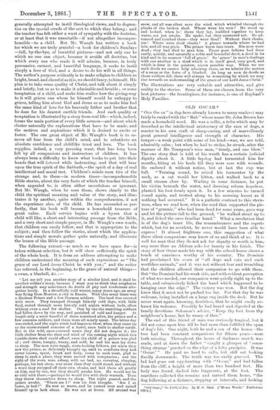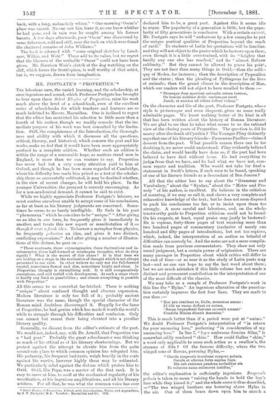OLD OSCAR.*
"OLD OSCAR" (a dog-hero already known to many readers) may fairly be ranked with the " Rab " whose name Dr. John Brown has made a household word. He was a collie, a tribe which may be described as the intellectual aristocracy of the race of dogs, a master in his own craft of sheep-caring, and of marvellously great general intelligence and strength of character. His temper—a weak point with some of his kind—was, we are told, admirably calm ; but when he had to strike, he struck, after the manner of Mr. Tennyson's wise man, "firmly, and one blow." The one story that is told of his wrath has a certain judicial dignity about it. A little lapdog had tormented him for months, biting at his heels till they were sore with wounds. He endured it without notice, but at last the cup was full. "Turning round, be seized his tormentor by the neck, as a cat would her kitten, and walked back to a small stream close by. Wading in some distance, he put his victim beneath the water, and deeming reform hopeless,. planted his foot firmly upon it. In a few minutes he turned round again, and trotted along to his morning haunt as if nothing had occurred." It is a pathetic contrast to this stern- ness, when we read how, when the cord that supported the pic- ture of "grannie," who had been dead for some years, gave way and let the picture fall to the ground, "he walked strait up to it, and licked the once familiar hand." What a revelation that is of the dog's inner life, the remembrances and the regrets which, but for an accident, he never would have been able to express ! It almost frightens one, this suggestion of what these silent companions may know of us and think of us. It is well for man that they do not ask for dignity or worth in him, any more than an African asks for beauty in his fetish. The story of how Oscar made his way with the school-house shows a touch of canniness worthy of his country. The Dominie had proclaimed his scorn of "all dogs and cats and such worthless animals," and it was not without fear and trembling that the children allowed their companion to go with them. But' the Dominic had his weak side, and with evident perception of what was needed, our companion went quietly right up to the table, and submissively licked the hand which happened to be hanging over the edge." The victory was won. But the dog knew that it must not be pushed too far. For that day he was welcome, being installed on a large rug inside the desk. But he never went again, knowing, doubtless, that he might easily ex- haust his welcome. Possibly he had heard and digested at the family devotions Solomon's advice, "Keep thy foot from thy neighbour's house, lest he weary of thee."
The end of this friend of man was curiously tragical, but it did not come upon him till he had more than fulfilled the span of dog's life. One night, both he and a son of the house—the two had been constant companions for fifteen years—were both missing. Throughout the hours of darkness search was made, and at dawn the father "caught a glimpse of 'some- thing strange' perched on the edge of a lofty precipice. It was ' Oscar.' " He paid no heed to calls, but still sat looking fixedly downwards. The truth was too easily guessed. The lad had gone out egg-hunting with "Oscar," and had fallen from the cliff, a height of more than two hundred feet. His body was found, dashed into fragments, at the foot. The searchers collected the remains and carried them home, "the dog following at a distance, stopping at intervals, and looking
"Ohl Oscar," thc Faithful Dog. By H. G. Reid. ("Home Words" Publishing Office.)
place was vacant. No one saw him leave it, no one knew whither he had gone, and in vain was he sought among his former haunts. A few days afterwards, poor ' Oscar ' was discovered by some fishermen, cold and stiff, near the rock on which were found the shattered remains of John Williams."
The book is adorned with "some original sketches by Land- seer, Wilkie, and Weir." These add to its value, but we regret that the likeness of the veritable " Oscar " could not have been given. Mr. Harrison Weir's sketch of the dog watching on the cliff, which forms the frontispiece, is well worthy of that artist, but is, we suppose, drawn from imagination.







































 Previous page
Previous page